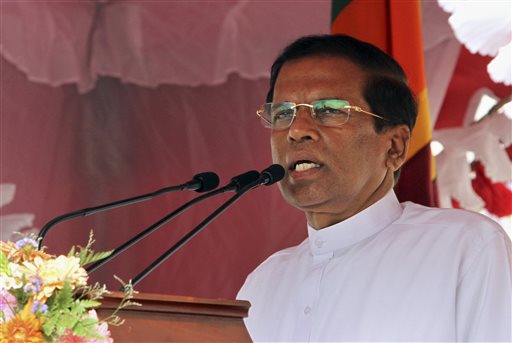Coup averted in Sri Lanka–new government

Sri Lanka’s new President Maithripala Sirisena addresses the nation outside the Temple of Tooth in Kandy, Sri Lanka, Sunday, Jan. 11, 2015. Sri Lanka’s new government will investigate an alleged attempt by former President Mahinda Rajapakse to stage a coup to try to stay in power when results showed he was losing last week’s election, a spokesman for the country’s new leader said Sunday. AP PHOTO/SANKA GAYASHAN
COLOMBO, Sri Lanka–Sri Lanka’s new government on Sunday accused toppled strongman Mahinda Rajapakse of having tried to stage a coup to cling to power after losing last week’s presidential election.
Rajapakse, South Asia’s longest-serving leader before being beaten in Thursday’s polls, had been widely praised for conceding defeat to Maithripala Sirisena before the final results were announced.
But a top aide to Sirisena told reporters that Rajapakse had in fact tried to persuade the army and police chiefs to help him stay in office with the use of force.
“People think it was a peaceful transition. It was anything but,” Mangala Samaraweera, who is expected to be named as Sirisena’s foreign minister, told a press conference.
“The first thing the new cabinet will investigate is the coup and conspiracy by president Rajapakse.
“He stepped down only when the army chief and the police Inspector General (N.K. Illangakoon) refused to go along with him.”
Illangakoon was “very vocal and did not want to be a party to this coup” while army chief Daya Ratnayake also refused to deploy troops for Rajapakse to hold onto power, said Samaraweera.
The attorney general’s department had also warned that there would be “dangerous consequences,” he said.
Samaraweera said foreign powers had also put pressure on Rajapakse, who came in for international criticism during his near-decade in office over his administration’s human rights record, to cede office.
Critics have also accused the former president of increasing authoritarianism and a culture of nepotism and corruption.
“Some world leaders also spoke with president Rajapakse and prevailed on him to ensure a peaceful transition,” Samaraweera said.
“I don’t know who had spoken (to him), but we know some leaders did talk to him.”
US Secretary of State John Kerry and even Sirisena himself thanked Rajapakse for quitting in the early hours of Friday, after his defeat in an election he had seemed certain to win when he called it in November.
The head of the army was not immediately available for comment, but military spokesman Ruwan Wanigasooriya said he was “not aware of such a coup attempt.”
Samaraweera said it was important for the new administration to disclose what had happened while results were being released, and an independent investigation probe would be a priority.
In an address to the nation, Sirisena appealed for a government of national unity to carry out the political and economic reforms he promised in his election campaign.
Rajapakse party splits
Rajapakse suffered another blow when a section of the policy-making central committee of his Sri Lanka Freedom Party (SLFP) broke away and pledged support to Sirisena.
Sirisena loyalist Duminda Dissanayake said they had appointed the country’s new president as the leader of their party, a move that was immediately challenged by the Rajapakse camp.
The split is a serious setback to Rajapakse’s attempt to retain control of his party, which has already been hit by a large number of defections after former health minister Sirisena broke away late last year.
The new president on Sunday invited all parties to join his cabinet, which is expected to be finalized by Jan. 19 when parliament opens.
He reiterated a call to normalize relations with Western nations and neighboring India.
Rajapakse had alienated many foreign leaders by refusing to allow an international probe into allegations of mass civilian casualties in the brutal finale to Sri Lanka’s 37-year Tamil separatist war in 2009.
Another top lieutenant said Sirisena had already received the backing of more than 40 lawmakers previously loyal to Rajapakse, virtually assuring approval for his program of radical constitutional reforms.
“We now have more than we need in parliament,” Rajitha Senaratne told AFP.
The new leader has already pledged to reverse many of the constitutional changes made by his predecessor, which gave huge powers to the president.
Even Rajapakse’s SLFP has said it will support Sirisena’s constitutional reforms, making their enactment a formality.
Sirisena quit Rajapakse’s cabinet in November to emerge as an opposition unity candidate in the Jan. 8 polls, triggering a mass defection of lawmakers.
While Rajapakse still retains significant support from the majority Sinhalese community, anger had been growing over rising levels of corruption.
Rajapakse had installed relatives in some of the most sensitive posts, including his younger brother Gotabhaya as defense secretary.–Amal Jayasinghe














